北师大版(2019)必修 第一册Unit 1 Life Choices Writing Workshop课件(共18张PPT)
文档属性
| 名称 | 北师大版(2019)必修 第一册Unit 1 Life Choices Writing Workshop课件(共18张PPT) |
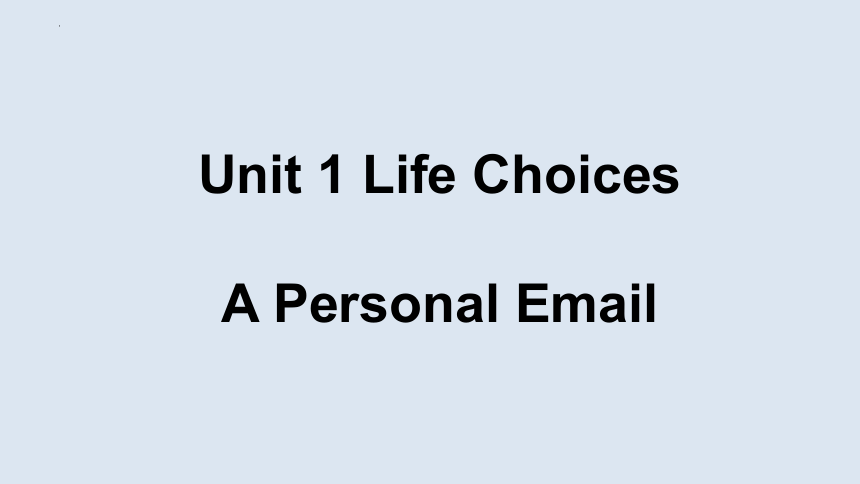
|
|
| 格式 | pptx | ||
| 文件大小 | 505.5KB | ||
| 资源类型 | 教案 | ||
| 版本资源 | 北师大版(2019) | ||
| 科目 | 英语 | ||
| 更新时间 | 2023-11-28 12:41:52 | ||
图片预览

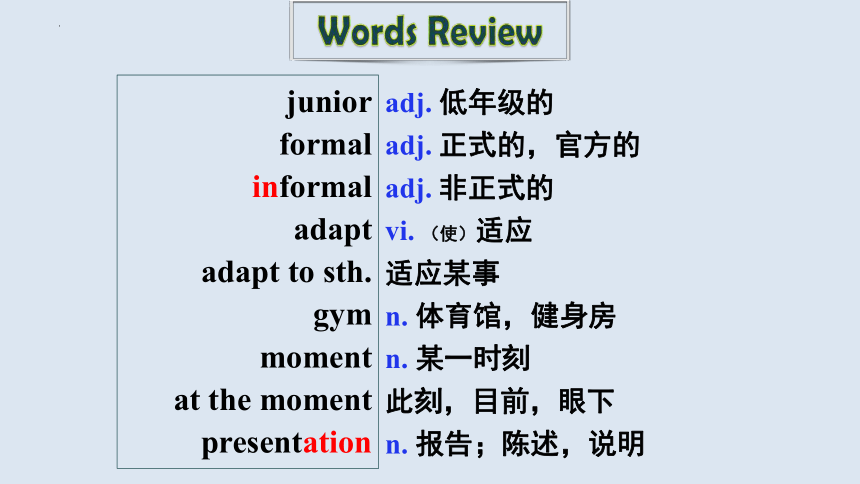

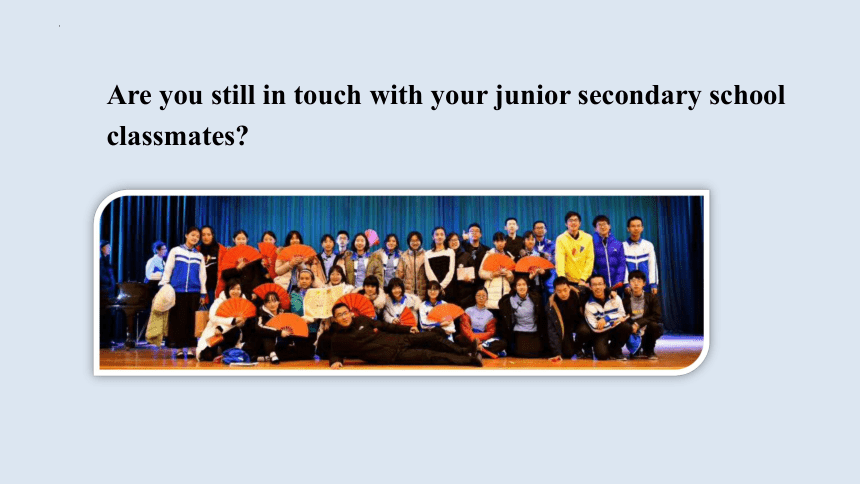
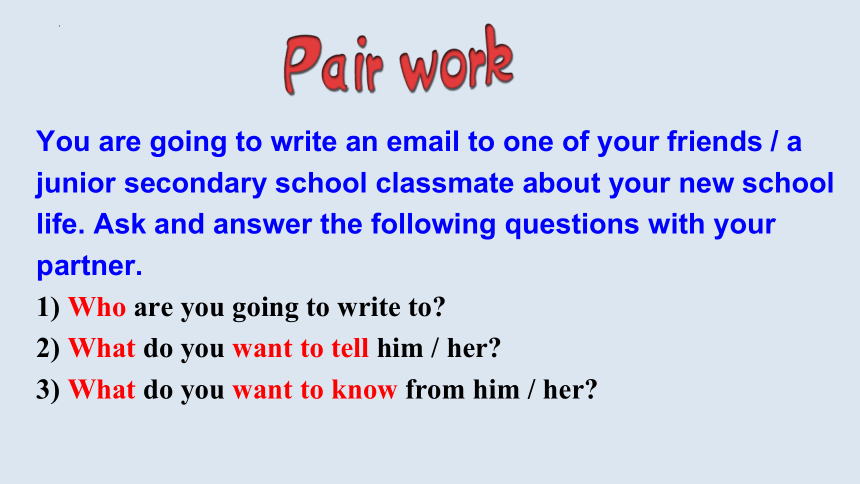

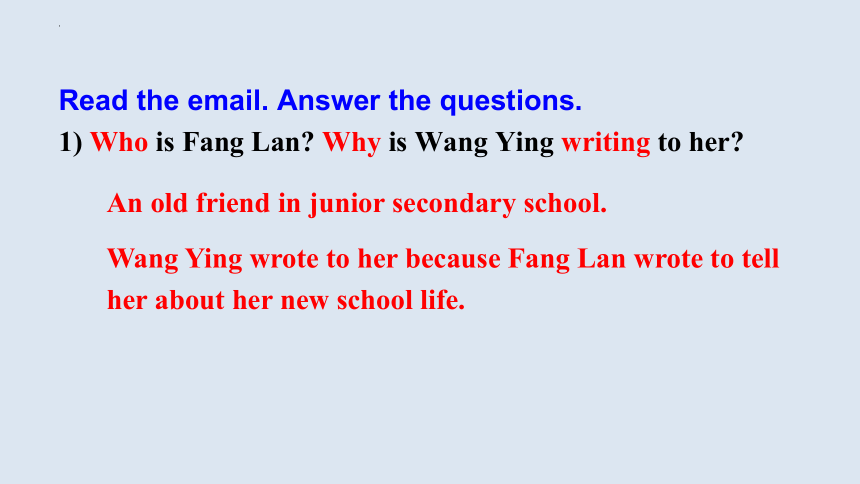
文档简介
(共18张PPT)
Unit 1 Life Choices
A Personal Email
junior
formal
informal
adapt
adapt to sth.
gym
moment
at the moment
presentation
adj. 低年级的
adj. 正式的,官方的
adj. 非正式的
vi. (使)适应
适应某事
n. 体育馆,健身房
n. 某一时刻
此刻,目前,眼下
n. 报告;陈述,说明
slide
forward
look forward to (doing) sth.
期待,盼望
n. 幻灯片
adv. 向前;进展
Are you still in touch with your junior secondary school classmates
You are going to write an email to one of your friends / a junior secondary school classmate about your new school life. Ask and answer the following questions with your partner.
1) Who are you going to write to
2) What do you want to tell him / her
3) What do you want to know from him / her
Wang Ying has written an email. Predict what you will read about.
1) Do you think the email will be formal or informal
2) How will you be able to tell
3) What topics might be mentioned
Read the email. Answer the questions.
1) Who is Fang Lan Why is Wang Ying writing to her
An old friend in junior secondary school.
Wang Ying wrote to her because Fang Lan wrote to tell her about her new school life.
2) How does Wang Ying feel about her new school
She loves her new senior secondary school.
“I like the ‘new me’ ”.
3) How is her life in senior secondary school different from
junior secondary school
They don’t have a fixed classroom.
They have many different clubs after class.
4) Why does Wang Ying have to finish the email
She’s got a presentation tomorrow and she needs to finish her slides.
Label the elements on the left of the email.
a. ending and wishes
b. greeting
c. subject line
d. reason to finish writing
e. questions about the other person
f. information about one’s own life
g. signature
Reading for structure
c. Subject line
Subject: Hello from an old friend
Hi, Fang Lan,
How’s your life in Canada I hope you have adapted well to the new situation and are enjoying your new school.
I love my new senior secondary school. It’s much bigger than my junior secondary school and there’s a huge gym! Do you remember Xie Zijun Guess what –We’re in the same school! It’s always good to have a friend, right Life in senior secondary school is very different from junior secondary school! You know, we don’t have a fixed classroom! We go to different classes for different subjects and also for different levels. I’m in the same class with Zijun for English and physics but in different classes for Chinese and maths. We also have many different clubs after class. You know, I like dancing so I’m in the Dancing Club. At the moment, we meet twice a week and we’re preparing to attend a competition. I think my new school gives me a chance to become a different person and I like the “new me”.
Well, I must go now. I’ve got a presentation tomorrow and I need to finish my slides. I look forward to hearing all about what’s happening with you soon.
All the best!
Wang Ying
b. Greeting
e. Questions about the other person
f. Information about one’s own life
d. Reason to finish writing
a. Ending and wishes
g. Signature
Reading for Style
Read the email again to figure out:
Is the email formal or informal
Why is it written this way
Informal. Because it is an email to someone we know very well (friends, family members, etc.).
Contractions Dashes(—) and exlamation points(!) Informal words/phrases
Examples from the sample
Other examples
Find examples of informal expressions from the email and put them in the following table.
How’s... I’m...
She’s... I’ve...
It’s... Don’t...
What’s...
guess what—; gym! me! school!
Hi, Guess what,
Right You know,
Well, All the best!
That’s...
There’s...
I’d... Let’s...
Hello, isn’t it
Sorry! Great!
Come on,
Don’t you...
Focus on Style
The specific features of the formal style and informal style
Length of sentences Manners of speaking Features of expressions Examples of
expressions
Formal
Informal
longer,
complete
shorter
mild and
indirect
contain contractions
and colloquial
or slang expressions
Would you mind, please thank you
yeah, sure, OK, cheers, thanks,
right
contain some polite words and expressions
Direct
Look at the Sentence Builder and find more example sentences using the following sentence structures in the email.
Subject + Verb + Object
Subject + Verb + Predicative
There + Be + Real Subject
Subject + Verb + Indirect Object + Direct Object
Focus on Language
According to what you have talked about in the dialogue with your partner, write 4 sentences about your new school life by following the sentence structures.
Example:
My new school has a huge library where I like to study.
My class size is much bigger now.
We move between classrooms for different subjects.
I have made lots of new friends which makes me happy.
Writing-Step 1 Outlining
Complete the outline of your email based on the format and sentences we have discussed.
Greeting: ______________________________
Reasons to write the letter: _________________________________________________________
________________________________________________________________________________
Information about your new school and your life here: _________________________________
________________________________________________________________________________
Ending: ________________________________________________________________________
Writing-Step 2 Drafting
Use your outline and the Writing Help to write the first draft.
Unit 1 Life Choices
A Personal Email
junior
formal
informal
adapt
adapt to sth.
gym
moment
at the moment
presentation
adj. 低年级的
adj. 正式的,官方的
adj. 非正式的
vi. (使)适应
适应某事
n. 体育馆,健身房
n. 某一时刻
此刻,目前,眼下
n. 报告;陈述,说明
slide
forward
look forward to (doing) sth.
期待,盼望
n. 幻灯片
adv. 向前;进展
Are you still in touch with your junior secondary school classmates
You are going to write an email to one of your friends / a junior secondary school classmate about your new school life. Ask and answer the following questions with your partner.
1) Who are you going to write to
2) What do you want to tell him / her
3) What do you want to know from him / her
Wang Ying has written an email. Predict what you will read about.
1) Do you think the email will be formal or informal
2) How will you be able to tell
3) What topics might be mentioned
Read the email. Answer the questions.
1) Who is Fang Lan Why is Wang Ying writing to her
An old friend in junior secondary school.
Wang Ying wrote to her because Fang Lan wrote to tell her about her new school life.
2) How does Wang Ying feel about her new school
She loves her new senior secondary school.
“I like the ‘new me’ ”.
3) How is her life in senior secondary school different from
junior secondary school
They don’t have a fixed classroom.
They have many different clubs after class.
4) Why does Wang Ying have to finish the email
She’s got a presentation tomorrow and she needs to finish her slides.
Label the elements on the left of the email.
a. ending and wishes
b. greeting
c. subject line
d. reason to finish writing
e. questions about the other person
f. information about one’s own life
g. signature
Reading for structure
c. Subject line
Subject: Hello from an old friend
Hi, Fang Lan,
How’s your life in Canada I hope you have adapted well to the new situation and are enjoying your new school.
I love my new senior secondary school. It’s much bigger than my junior secondary school and there’s a huge gym! Do you remember Xie Zijun Guess what –We’re in the same school! It’s always good to have a friend, right Life in senior secondary school is very different from junior secondary school! You know, we don’t have a fixed classroom! We go to different classes for different subjects and also for different levels. I’m in the same class with Zijun for English and physics but in different classes for Chinese and maths. We also have many different clubs after class. You know, I like dancing so I’m in the Dancing Club. At the moment, we meet twice a week and we’re preparing to attend a competition. I think my new school gives me a chance to become a different person and I like the “new me”.
Well, I must go now. I’ve got a presentation tomorrow and I need to finish my slides. I look forward to hearing all about what’s happening with you soon.
All the best!
Wang Ying
b. Greeting
e. Questions about the other person
f. Information about one’s own life
d. Reason to finish writing
a. Ending and wishes
g. Signature
Reading for Style
Read the email again to figure out:
Is the email formal or informal
Why is it written this way
Informal. Because it is an email to someone we know very well (friends, family members, etc.).
Contractions Dashes(—) and exlamation points(!) Informal words/phrases
Examples from the sample
Other examples
Find examples of informal expressions from the email and put them in the following table.
How’s... I’m...
She’s... I’ve...
It’s... Don’t...
What’s...
guess what—; gym! me! school!
Hi, Guess what,
Right You know,
Well, All the best!
That’s...
There’s...
I’d... Let’s...
Hello, isn’t it
Sorry! Great!
Come on,
Don’t you...
Focus on Style
The specific features of the formal style and informal style
Length of sentences Manners of speaking Features of expressions Examples of
expressions
Formal
Informal
longer,
complete
shorter
mild and
indirect
contain contractions
and colloquial
or slang expressions
Would you mind, please thank you
yeah, sure, OK, cheers, thanks,
right
contain some polite words and expressions
Direct
Look at the Sentence Builder and find more example sentences using the following sentence structures in the email.
Subject + Verb + Object
Subject + Verb + Predicative
There + Be + Real Subject
Subject + Verb + Indirect Object + Direct Object
Focus on Language
According to what you have talked about in the dialogue with your partner, write 4 sentences about your new school life by following the sentence structures.
Example:
My new school has a huge library where I like to study.
My class size is much bigger now.
We move between classrooms for different subjects.
I have made lots of new friends which makes me happy.
Writing-Step 1 Outlining
Complete the outline of your email based on the format and sentences we have discussed.
Greeting: ______________________________
Reasons to write the letter: _________________________________________________________
________________________________________________________________________________
Information about your new school and your life here: _________________________________
________________________________________________________________________________
Ending: ________________________________________________________________________
Writing-Step 2 Drafting
Use your outline and the Writing Help to write the first draft.
同课章节目录
- Unit 1 Life Choices
- Lesson 1 Lifestyles
- Lesson 2 Understanding and Coping with Stress
- Lesson 3 Your Life Is What You Make It
- Unit 2 Sports and Fitness
- Lesson 1 The Underdog
- Lesson 2 Rules of the Game
- Lesson 3 Running and Fitness
- Unit 3 Celebrations
- Lesson 1 Spring Festival
- Lesson 2 Special Occasions
- Lesson 3 Memories of Christmas
